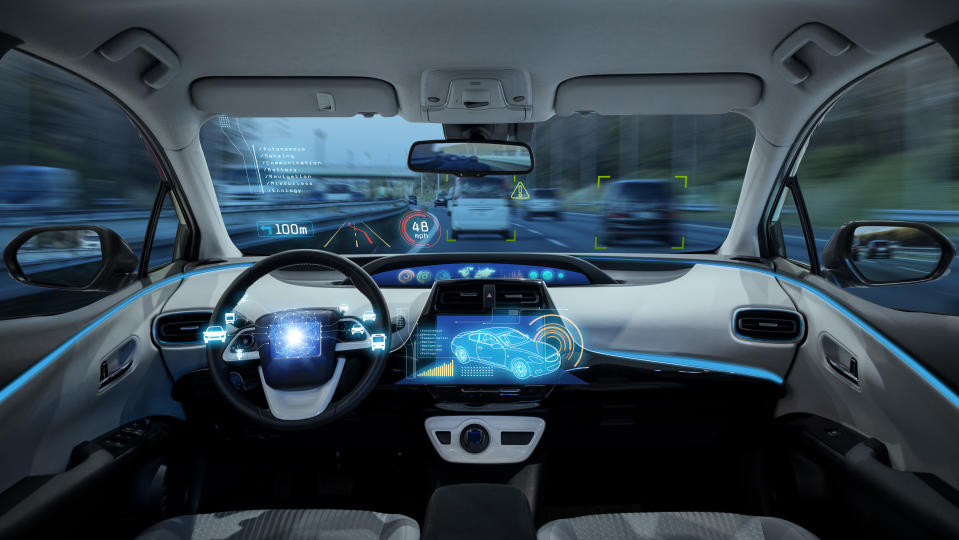3 Top Artificial Intelligence Stocks to Watch in June
For technology investors, artificial intelligence (AI) is the next frontier. And for good reason, as Accenture finds investments in AI will turbocharge the economy, boosting productivity in the U.S. by more than a third and nearly doubling GDP growth rates. Early-stage AI investors are in a key position for multidecade returns.
We asked a trio of our Motley Fool contributors to highlight three companies well poised to take advantage of AI's growth. Read on for why IBM (NYSE: IBM), Alphabet (NASDAQ: GOOG) (NASDAQ: GOOGL), and Amazon.com (NASDAQ: AMZN) made their lists.
Image Source: Getty Images.
Elementary, my dear Watson
Anders Bylund (IBM): With $78.7 billion of trailing revenues and $17.7 billion in EBITDA profits, IBM is an instant giant in pretty much any niche it decides to address. Big Blue has gone far beyond simply participating in the artificial intelligence business, though. The company is at the forefront of driving the AI issue on a global level, and has been for decades.
The IBM Watson AI platform sits at the core of everything the company does nowadays. Watson is a part of more than 16,000 IBM projects across 40 continents and 20 different industries. Impressive, right? But that's just the beginning of a much larger ambition. Speaking at a recent investor conference, Senior VP Arvind Krishna said that IBM -- and humanity in general -- have a lot of work left to do in this space.
"We are only in the first or second innings of a long way to go," Krishna said, according to a Seeking Alpha transcript. "This is all [...] narrow AI, and narrow AI means AI that works for one task in one domain."
At some point, machines should be able to mimic human intelligence, which means going beyond training the systems for a single task and expecting them to problem-solve on the spot.
"We believe we are decades away from that point," Krishna said. "That's what I call is going to be the next eight innings."
And IBM plans to stay in the vanguard of that development. This is why the company has been selling off low-margin hardware operations in recent years, focusing on long-term growth drivers, with AI near the center of every focus area. Watson is already a big deal and will only grow more important from here. As an IBM shareholder myself, I'm downright excited about the direction this centennial company is going today.

Image Source: Getty Images.
AI for an autonomous vehicle future
Chris Neiger (Alphabet): There are plenty of great applications for AI, but one of the most exciting -- and potentially life-saving -- is to use the tech for self-driving vehicles. Autonomous vehicles (AVs) use a combination of sensors and AI software to navigate some of the same difficult road conditions and scenarios that humans do, and once this technology becomes ubiquitous, it could eliminate an estimated 90% of vehicular fatalities.
That's one of the reasons why what Alphabet is doing with its self-driving vehicle subsidiary, Waymo, is so important. Waymo's vehicles have logged more than 10 million autonomous miles on public roads and over 7 billion virtual miles of testing. With all of this experience, it's no wonder why Waymo is a leader in the AV space and why its AI systems helped launch one of the first commercial autonomous ridesharing services, Waymo One.
Waymo One allows a small group of riders in the Phoenix area to hail self-driving rides around town, and the company has plans to expand the service, as well as potentially license its technology to other companies.
For the skeptics out there who think that Alphabet's bet on autonomous vehicles is misplaced, consider that AVs will create a massive "passenger economy" that Intel believes will be worth $7 trillion by 2050. With all of this potential, investors need to take a closer look at what Alphabet is doing with artificial intelligence right now and consider adding this AI leader to their portfolio.
As if you needed another reason to buy Amazon
Jamal Carnette, CFA (Amazon): Despite Amazon's mega-cap status, more than 90% of analysts have a buy/outperform rating on the company, and for good reason: Amazon is well situated in three businesses -- e-commerce, cloud computing, and digital advertising -- with long-term runways for growth. But even the experts are undervaluing Amazon's AI opportunity.
Amazon's AWS cloud computing business will directly benefit from AI. The technology, by definition, requires a significant ramp in compute and store functions. The ease of scalability under cloud-based infrastructure will be yet another blow to the on-premise server market. As the market-share leader, look for Amazon's true profit center to continue to post rapid growth rates as AI technology proliferates.
AI will also boost Amazon's e-commerce and digital advertising businesses by obtaining and computing better information on consumers. This makes advertisements and recommendations more relevant and effective, which allows Amazon to charge more for ads and/or conduct more transactions. Amazon is well situated to provide long-term returns from AI and should be valued accordingly.
More From The Motley Fool
John Mackey, CEO of Whole Foods Market, an Amazon subsidiary, is a member of The Motley Fool's board of directors. Suzanne Frey, an executive at Alphabet, is a member of The Motley Fool's board of directors. Anders Bylund owns shares of Alphabet (A shares), Amazon, IBM, and Intel. Chris Neiger has no position in any of the stocks mentioned. Jamal Carnette, CFA owns shares of Alphabet (C shares) and Amazon. The Motley Fool owns shares of and recommends Alphabet (A shares), Alphabet (C shares), and Amazon. The Motley Fool is short shares of IBM. The Motley Fool has a disclosure policy.

 Yahoo Finance
Yahoo Finance 